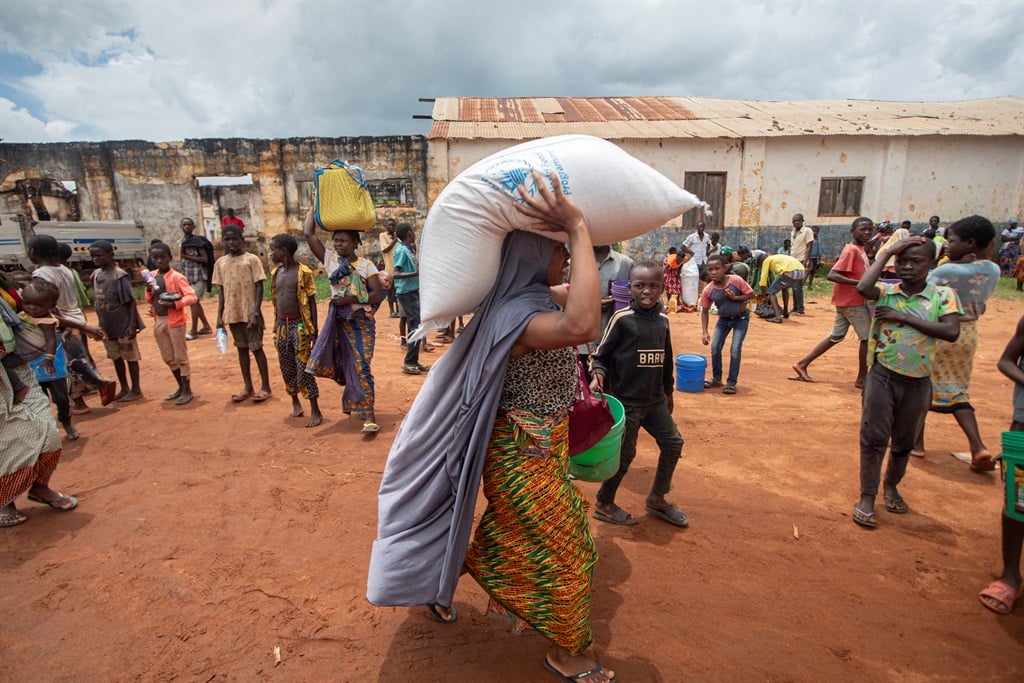
A woman carries a bag of food distributed by the World Food Program (WFP) to displaced people in Cabo Delgado province at the Tribune School in Namapa town, Elati district, Nampula province, Mozambique, on April 21. (Alfred Zuniga/AFP)
- According to UNICEF, 125 schools have been closed since January, including 109 in Cabo Delgado and 16 in the member districts of Nampula.
- Disinformation and violence are rampant in Cabo Delgado's Chiure district, including attacks on cholera treatment infrastructure and staff.
- SADC and the Rwanda Defense Force estimated that they faced between 160 and 200 veteran militants.
Jihadists have attacked schools in northern Mozambique, displacing mainly women and children, according to a preliminary report from the United Nations Children's Fund (UNICEF).
More than 70,000 people have been internally displaced in the oil and gas-rich Cabo Delgado and neighboring Nampula province, which have been under attack by Mozambican rebels since January. According to UNICEF, 85% of them were women.
The report highlighted that more than 100 schools were closed in Cabo Delgado, and 16 more in Member District, Nampula province.
UNICEF is concerned that the current evacuations will worsen the already critical situation caused by cholera outbreaks in six districts of Cabo Delgado and Nampula, but says: We are following up with host families to ensure appropriate intervention activities are implemented.”
In Cabo Delgado's Chiure district, cholera is treated like a myth, leading to “disinformation and violence as residents attack cholera treatment infrastructure and staff.”
Read more | Displaced Mozambicans recall horrors of new jihadist attacks as they flee south
According to the report, 10,900 people or 2,500 households have been evacuated to seven evacuation sites within Kiure: Maningane, Muadjaja, Kufe, Namitua, Nahabara, Meriha and Namisir. An unspecified number of internally displaced persons (IDPs) remain in host communities.
Hunger is also a challenge, and UNICEF is “screening and treating acute malnutrition in children and pregnant women” in Kiure.
With limited funds, the World Food Program (WFP) in Mocimboa da Praia announced on January 21 that it would limit supplies to provide only orphans, sparking anger among local residents.
Local residents claimed that orphans were not the only ones affected by the conflict.
But while WFP explained that it was distributing aid based on “vulnerability-based targeting”, it suggested that communities should invest in local agriculture to fill the gap. .
conflict
Since November 2017, a non-state armed group associated with the Islamic State of Mozambique (ISIS) (also known as Ansar al-Sunna and locally known as al-Shabab) (not affiliated with the Somali terrorist group) Violence is taking place.
The revolt was motivated by the perceived socio-economic exclusion of local populations amidst major mineral and hydrocarbon discoveries, also known as liquefied natural gas, which brought investment from TotalEnergies. ing.
To fight the insurgency, SADC has deployed standby forces separate from the Rwanda Defense Force (RDF), which has a similar mission.
The latest report from the United Nations Analytical Assistance and Sanctions Monitoring Team estimates that SADC and RDF are dealing with “approximately 160 to 200 seasoned combatants.”
Last December, Russia's ambassador to Mozambique, Alexander Surikov, said that the Russian government was ready to help Mozambique fight the rebels, but that looking at the situation, the situation was not bad.
But “if they (Mozambique) need special assistance, we will always be by their side,” the Russian ambassador said.
According to a situation overview report from January 20 to February 2 by data collection company ACLED, the first attack during this period occurred on January 28, when rebels attacked a field in the Pro Forest of Metuge near Ankuabe. beheaded a man.
Metugeh district administration confirmed the killing, and Islamic State (IS) claimed responsibility for capturing and executing people in the area.
News24 Africa Desk is supported by the Hans Seidel Foundation. Articles produced through Africa Desk, and the opinions and statements contained herein, do not reflect the opinions and statements of the Hans His Seidel Foundation.

